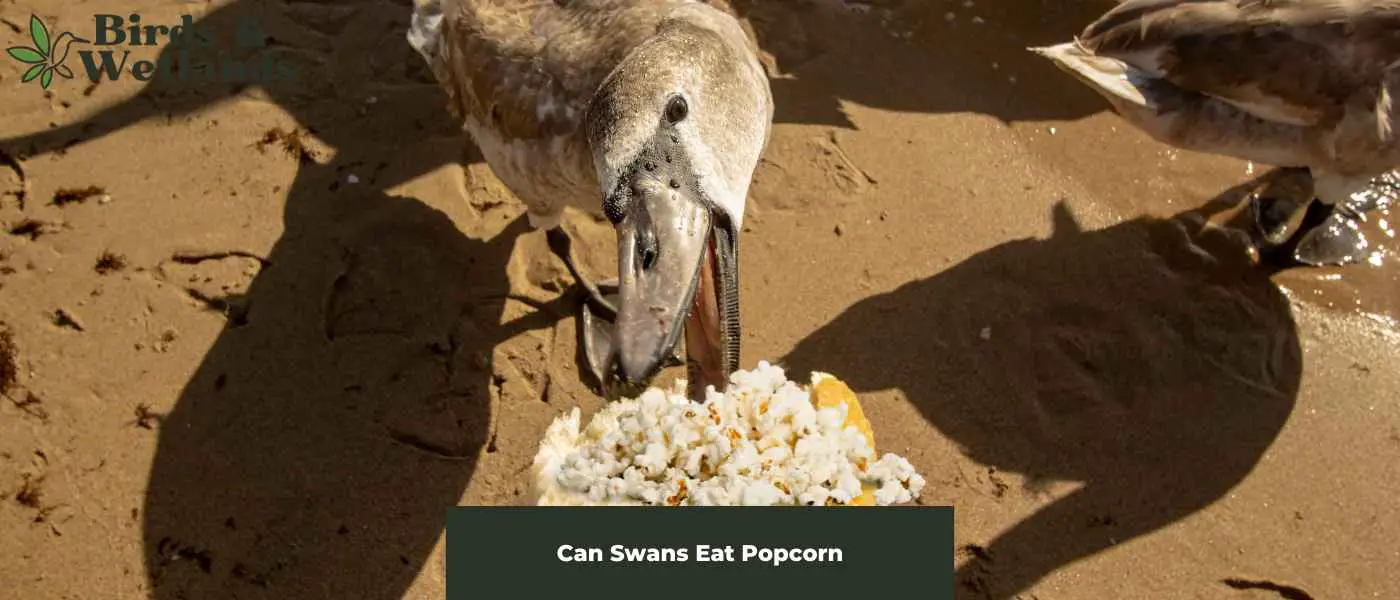Swans are herbivorous birds that feed on aquatic vegetation, such as algae, duckweed, and water lilies. However, many people enjoy feeding swans with human food, including popcorn.
While popcorn may seem like a harmless treat, it is important to consider whether it is safe for swans to consume.
But can swans eat popcorn safely?
Swans can nibble on popcorn, but it’s important to remember that it shouldn’t be a major part of their diet. If you decide to offer popcorn to swans, choose plain, air-popped popcorn without added salt, butter, or flavorings. While popcorn may serve as an occasional snack for swans, it’s essential to focus on providing them with a diverse diet.
Key Takeaways on Giving Swans Popcorn
- Swans are herbivorous birds that primarily consume aquatic vegetation, but they are capable of consuming other types of food, including human food.
- Popcorn is a popular snack among people, but it is not an ideal food for swans due to its high salt and fat content.
- Swans have a unique digestive system that is adapted to processing tough plant material, and they may not be able to digest certain human foods, including popcorn.
- Feeding swans popcorn or any other human food can lead to health problems, including malnutrition, digestive issues, and potential hazards such as choking.
- If you want to feed swans, it is best to stick to appropriate foods, such as whole grains, chopped vegetables, or specially formulated swan food.
Can young swans eat popcorn?
Baby swans, also known as cygnets, are primarily herbivores, meaning they eat mostly plants. These majestic birds supplement their diet with protein by eating small insects, fish and frogs.
Young birds have sensitive and developing digestive system, so popcorn is not the best food for them. Popcorn is processed food and does not provide the necessary nutrients for proper growth and development.
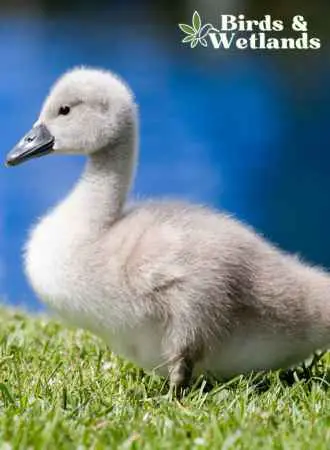
Why popcorn is bad for swans?
Swans eat bread, but it doesn’t mean they should eat it. People feed bread to swans without knowing that feeding swans bread often lead to health and nutritional imbalances.
Eating bread and other foods is an acquired taste for most animals since these are human foods. They contain refined flour, sugar and other ingredients that harm the swan. They have a higher protein count too.
Too much bread make a swan weak and possibly infertile, affecting its ability to produce offspring. Even if they can produce offspring, the young swan will be born unhealthy.
Feeding bread can also lead to overeating, with uneaten food being left behind. Moldy bread is bad for the swan’s health, can pollute waterways and can attract rodents and other pests.
For the same reasons not to feed swans bread, you should stop feeding popcorn to swans. Popcorn is not inherently bad for swans, but if it is not properly prepared or fed to them, it can risk their health.
Swans have a sensitive digestive system, and consuming large amounts of plain popcorn, or caramel popcorn that has been flavored or salted, can lead to health problems such as malnutrition, blockages in their digestive tract, and even death. It is also not a natural food for them, providing little nutritional value.
Feeding swans popcorn or any human food can also lead to dependence and disrupt their natural foraging behaviors. So it is best not to feed swans popcorn or any human food.
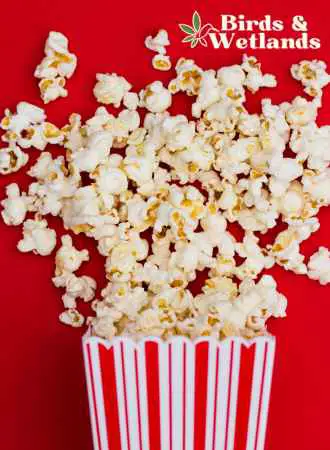
What to feed swans instead of popcorn and seed balls?
Popcorn is not the healthiest option, as it lacks important nutrients and can cause digestive problems. Instead of popcorn and salty foods, people should provide swans with a balanced diet that includes a variety of foods for optimal health.
Some nutritious alternatives to popcorn include oats, barley, wheat, vegetables such as kale or spinach, and pieces of fruit like apples or pears.
Additionally, commercial bird feed mixes are available at the pet shop that have been specially formulated for waterfowl and contain a variety of seeds, grains, and pellets. You don’t even bird feeders when feeding these foods to swans.
You can also feed them duck food mixed with lettuce, cabbage and other leafy greens. Other vegetables include bite-sized pieces of carrots, green beans, celery and alfalfa sprouts.
Many birds including swans eat insects and worms so mealworms and dried crickets are good options.
In their natural habitat, swans like ducks eat algae, aquatic plants and small fish. As they grow older, swans favor aquatic vegetation over small animals for normal nutrition. They will also consume food of about 20% to 25% their body weight.
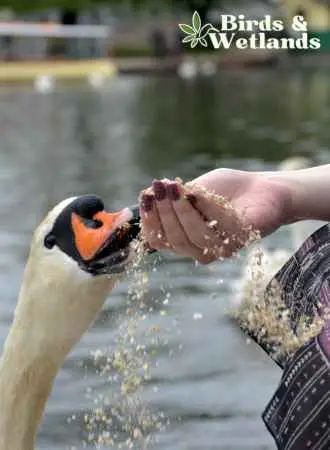
Can swans get the condition called angel wing from eating popcorn?
Angel wing, also known as wing dysplasia, is a condition that affects waterfowl such as swans, geese, and ducks. The defect is characterized by the abnormal growth and malformation of the birds’ wing bones, which causes the feathers on the outer edge of the wing to stick out at an angle.
Several factors, including genetics, diet, and environmental factors, cause the condition. Feeding geese, ducks and swans a diet high in protein and carbohydrates, or feeding them human food, can cause the abnormal bone growth associated with angel wings. Feeding them too much bread and corn can cause the condition as well.
Angel wings can make it difficult for affected birds to fly and make them more vulnerable to predation and other hazards. In severe cases, the condition can be debilitating and lead to the birds’ death. In other cases, the affected swan is the recipient of bullying from other swans.
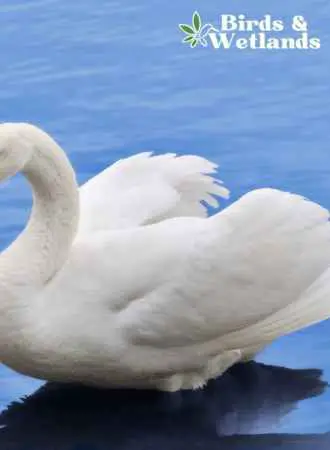
Related Questions on Swan’s Natural Diet
What wild animals eat swans?
Here is a list of wild animals that are known to prey on swans:
- Coyotes
- Foxes
- Hawks
- Owls
- Eagles
- Herons
- Alligators
- Snapping Turtles
It’s important to note that many of these animals only eat swans if other food sources are scarce or if the swans are weak or injured. Also, many of these animals are opportunistic feeders, they will eat whatever is available and easy to catch.
Is feeding food to swans good for these birds?
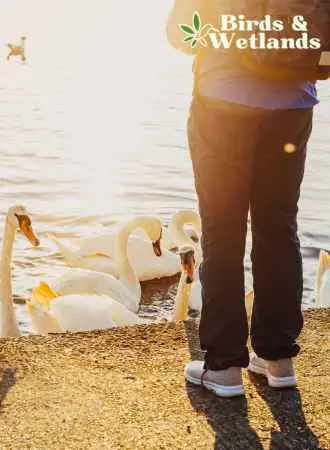
There are three swan species in North America — the tundra swan, trumpeter swan and mute swan. A fourth species, the whooper swan, winters in some parts of Alaska. The black swan is not common in the continent.
Feeding swans at local parks has become a popular pastime for many people because of the swans’ grace and beauty and their accessibility in urban and suburban areas. Swans will eat anything you offer them.
Many people find the act of feeding the swans to be a calming and enjoyable experience. Additionally, some people may have fond memories of feeding swans in the past, such as on family trips to parks or lakes, and continue to do so as adults.
However, it’s important to note that feeding swans in public parks can also negatively impact the health and well-being of the swans and the ecosystem of the park.
Feeding mature swans human food can disrupt their natural foraging behaviors and lead to dependence on handouts, which can lead to malnourishment and health problems.
Other Food to Feed Swans
Best Waterfowl Feed
Delightful Feeding Experience
Transform your backyard into a scenic waterfowl habitat and enjoy an interactive feeding experience with Natural Waterscapes Waterfowl Floating Food.

Pros
- Nutritious Food: Natural Waterscapes Waterfowl Floating Food is specifically designed to provide essential nutrients to waterfowl, including swans, geese, and ducks, helping them maintain a healthy diet.
- Convenient: The food comes in resealable packaging, making it easy to store and use as needed. It is also easy to handle and transport.
- Floating Formula: The floating formula of the food allows it to remain on the surface of the water, making it easier for waterfowl to eat and minimizing the risk of water contamination.
- Attracts Waterfowl: The food is formulated to attract various waterfowl species, including swans, geese, and ducks, to your pond, lake, or other water body, providing an opportunity to observe and enjoy these beautiful creatures.
- Environmentally Friendly: Natural Waterscapes Waterfowl Floating Food is made with environmentally friendly ingredients and does not contain any harmful preservatives, making it safe for both waterfowl and the environment.
Cons
- Shelf Life: The food’s shelf life may be limited compared to other types of waterfowl food due to its natural ingredients and lack of preservatives. This means you may need to use it up quickly after opening the package to prevent it from going bad.

